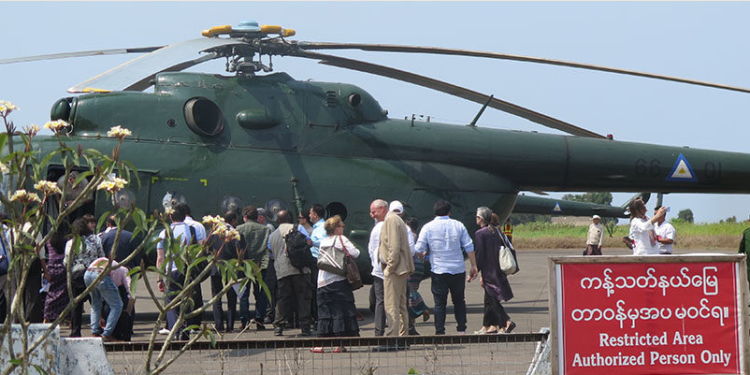YANGON — Myanmar’s ambassador to the United Nations on Monday urged the UN Security Council to investigate the “atrocities” of the Arakan Rohingya Salvation Army (ARSA) against civilians while Western nations continued pressing Myanmar to cooperate in a credible probe into last year’s violence in Rakhine State.
The remarks came at a Security Council briefing in New York and followed a Security Council delegation’s visit in early May to Rakhine, where ARSA’s attacks on 30 security posts in late August triggered a sweeping military clearance operation that has driven some 700,000 mostly Rohingya to Bangladesh amid widespread reports of arson, rape and murder by security forces.
The EU and US have imposed targeted sanctions against top military generals in response, while rights groups are urging the UN to help ensure the Rohinyas’ safe return and to refer Myanmar to the International Criminal Court. ARSA had also been calling for international pressure on Myanmar before falling silent in January.
At Monday’s Security Council briefing, representatives from the UK and the Netherlands recalled the widespread destruction of villages they saw in Rakhine and the reports of abuse they heard from Rohingya refugees in Bangladesh.
US Ambassador to the UN Nikki Haley said it was critical for the Security Council delegates to have learned about the crisis in Rakhine and the challenges facing Rohingya refugees firsthand. She said one of the reasons for the trip was “the continuing, disheartening response from the Burmese government” and went on to accuse Myanmar authorities of failing to acknowledge their role in the crisis.
“This is unacceptable and unsustainable if we’re going to make any progress in ending the violence in Rakhine State. More than that, we must have the will as a council to do something now. Time is not on our side. The monsoon season has already begun and is putting hundreds of thousands of refugees at further risk,” she said.
Haley encouraged Myanmar to cooperate in a credible independent investigation into the alleged abuses of its security forces and to lift an entry ban it imposed on the UN’s special rapporteur on the situation of human rights in Myanmar in December. She also urged Myanmar to respect the basic rights of the Rohingya and made no mention of ARSA’s alleged violence against non-Muslim groups.
In September, residents of Rakhine State’s Maungdaw Township unearthed a mass grave with some 45 bodies of Hindu villagers that were identified by relatives.
At the briefing, Myanmar’s ambassador to the UN, U Hau Do San, echoed the country’s military chief in stating that Myanmar would take action against any army personnel guilty of abuse if presented with solid evidence.
He blamed the current humanitarian crisis on ARSA’s attacks on the security posts in August and accused Western media of pushing “Muslim victimhood narratives” while sidelining the “terrorist” group’s attacks on Rakhine State’s other minorities, including Hindus, Maragmagyi and Mro.
“ARSA must also be held accountable for atrocities committed against civilian populations in Rakhine. Investigation of violations must include cases of terrorist atrocities as well,” he said.
U Hau Do San also accused ARSA members of killing Muslims in the Bangladesh refugee camps who were spreading information about the repatriation deal Dhaka and Naypyitaw struck in January. Not a single refugee has been repatriated to date, however, while each government accuses the other of delaying the process.
He complained that during the Security Council delegation’s visit to Maungdaw many non-Muslim locals had come to share accounts of ARSA attacks but only one Arakan and one Hindu woman had time to speak with them.
“Sadly, many tragic stories of the ethnic people in Rakhine have fallen on the deaf ears of some who wanted to listen to only one side of the story of their choice,” he said.

















